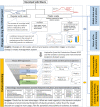Minimising the present and future plastic waste, energy and environmental footprints related to COVID-19
- PMID: 34234614
- PMCID: PMC7183989
- DOI: 10.1016/j.rser.2020.109883
Minimising the present and future plastic waste, energy and environmental footprints related to COVID-19
Abstract
The COVID-19 pandemic has had growing environmental consequences related to plastic use and follow-up waste, but more urgent health issues have far overshadowed the potential impacts. This paper gives a prospective outlook on how the disruption caused by COVID-19 can act as a catalyst for short-term and long-term changes in plastic waste management practices throughout the world. The impact of the pandemic and epidemic following through the life cycles of various plastic products, particularly those needed for personal protection and healthcare, is assessed. The energy and environmental footprints of these product systems have increased rapidly in response to the surge in the number of COVID-19 cases worldwide, while critical hazardous waste management issues are emerging due to the need to ensure destruction of residual pathogens in household and medical waste. The concept of Plastic Waste Footprint (PWF) is proposed to capture the environmental footprint of a plastic product throughout its entire life cycle. Emerging challenges in waste management during and after the pandemic are discussed from the perspective of novel research and environmental policies. The sudden shift in waste composition and quantity highlights the need for a dynamically reponsive waste management system. Six future research directions are suggested to mitigate the potential impacts of the pandemic on waste management systems.
Keywords: COVID-19 pandemic; Dynamic waste management; Environmental footprints reduction; Plastic waste footprint.
© 2020 Elsevier Ltd. All rights reserved.
Conflict of interest statement
The authors declare that they have no known competing for financial interests or personal relationships that could have appeared to influence the work reported in this paper.
Figures








Similar articles
-
Plastic waste footprint in the context of COVID-19: Reduction challenges and policy recommendations towards sustainable development goals.Sci Total Environ. 2021 Nov 20;796:148951. doi: 10.1016/j.scitotenv.2021.148951. Epub 2021 Jul 10. Sci Total Environ. 2021. PMID: 34271381 Free PMC article.
-
COVID pollution: impact of COVID-19 pandemic on global plastic waste footprint.Heliyon. 2021 Feb;7(2):e06343. doi: 10.1016/j.heliyon.2021.e06343. Epub 2021 Feb 20. Heliyon. 2021. PMID: 33655084 Free PMC article.
-
Plastic waste management during and post Covid19 pandemic: Challenges and strategies towards circular economy.Heliyon. 2024 Feb 5;10(4):e25613. doi: 10.1016/j.heliyon.2024.e25613. eCollection 2024 Feb 29. Heliyon. 2024. PMID: 38370243 Free PMC article. Review.
-
Analysis of plastic waste reduction and recycling in Taiwan.Waste Manag Res. 2021 May;39(5):713-719. doi: 10.1177/0734242X21996821. Epub 2021 Mar 21. Waste Manag Res. 2021. PMID: 33749391
-
Environmental Impacts of Personal Protective Clothing Used to Combat COVID- 19.Adv Sustain Syst. 2022 Jan;6(1):2100176. doi: 10.1002/adsu.202100176. Epub 2021 Oct 13. Adv Sustain Syst. 2022. PMID: 34901387 Free PMC article. Review.
Cited by
-
Assessment of public health laboratory preparedness and response in WHO South-East Asia region during the COVID-19 pandemic: lessons learned and future directions.Lancet Reg Health Southeast Asia. 2024 Oct 19;31:100496. doi: 10.1016/j.lansea.2024.100496. eCollection 2024 Dec. Lancet Reg Health Southeast Asia. 2024. PMID: 39498204 Free PMC article. Review.
-
Recycling Technologies for Biopolymers: Current Challenges and Future Directions.Polymers (Basel). 2024 Sep 30;16(19):2770. doi: 10.3390/polym16192770. Polymers (Basel). 2024. PMID: 39408479 Free PMC article. Review.
-
Optimization Modeling for Pandemic Vaccine Supply Chain Management: A Review and Future Research Opportunities.Nav Res Logist. 2024 Oct;71(7):976-1016. doi: 10.1002/nav.22181. Epub 2024 Apr 18. Nav Res Logist. 2024. PMID: 39309669
-
Global impact of COVID-19 on food safety and environmental sustainability: Pathways to face the pandemic crisis.Heliyon. 2024 Jul 24;10(15):e35154. doi: 10.1016/j.heliyon.2024.e35154. eCollection 2024 Aug 15. Heliyon. 2024. PMID: 39170381 Free PMC article. Review.
-
Risk Management for Whole-Process Safe Disposal of Medical Waste: Progress and Challenges.Risk Manag Healthc Policy. 2024 Jun 6;17:1503-1522. doi: 10.2147/RMHP.S464268. eCollection 2024. Risk Manag Healthc Policy. 2024. PMID: 38859877 Free PMC article. Review.
References
-
- Worldometer . 2020. COVID-19 Coronavirus pandemic.http://www.worldometers.info/coronavirus/#countries%3C; accessed 08.04
-
- Rajmohan K.V.S., Ramya C., Viswanathan M.R., Varjani S. Plastic pollutants: effective waste management for pollution control and abatement. Current Opinion in Environmental Science & Health. 2019;12:72–84.
-
- Windfeld E.S., Brooks M.S.-L. Medical waste management – a review. J Environ Manag. 2015;163:98–108. - PubMed
-
- Liu H.C., You J.X., Lu C., Chen Y.Z. Evaluating healthcare waste treatment technologies using a hybrid multi-criteria decision-making model. Renew Sustain Energy Rev. 2015;41:932–942.
LinkOut - more resources
Full Text Sources
